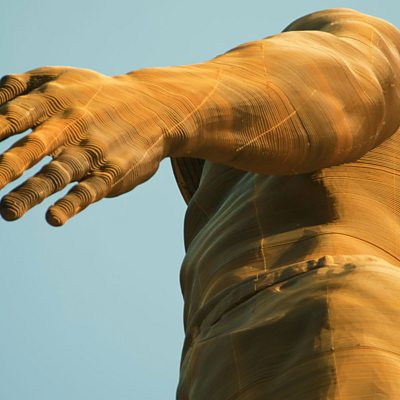Episode details

Available for over a year
Would you sip a cappuccino within sight of headstones? Brunch at a burial ground? Dine among the dead? These acts might to many of us seem morbid, but they’re becoming more commonplace in Germany due to the rise in popularity of the nation’s new “cemetery cafés”. These are spaces where people can gather among the graves to reflect, remember, and celebrate those that have gone before – places of stillness away from the hubbub, and hustle and bustle of life. A Guardian article this week explored the phenomenon, describing how cities such as Paris or New York where the dead are buried on the outskirts of town are less conducive to such cemetery cafes. In cities such as Germany’s capital Berlin, cemeteries have always been kiezbezogen – that is, rooted in communities. The dead among the living. This week, as we walk through our own communities, we’ll see houses decked out with ghosts and skeletons for Halloween – each dark decoration acting as a memento mori – a reminder that we will die. All Hallows Eve precedes All Saints Day in which the departed saints and martyrs are remembered. Though some Christians choose not to take part in Halloween festivities, for others, these symbols point to something profoundly hopeful: that Christ has overcome death, and that the grave no longer has the final word. We remember that we will die, but we believe that death is not the end. As it says in 1 Corinthians: “Death has been swallowed up in victory.” It's because of this belief that the earliest Christians were once thought strange for their closeness to death. While first century Roman law said the dead had to be buried far away to avoid contaminating the living, Christians would raise the bodies of martyrs in the air and parade them through the streets like trophies. They would gather to worship among the tombs, proclaiming that love is stronger than the grave. Perhaps, as we find new ways to remember the dead today, we’re recovering something of that ancient wisdom: that to face death honestly is also to glimpse the hope that lies beyond it. At the weekend during a family celebration, we took a moment to name those we had lost; quietly speaking their names – a susurration of grief as we ended with the words: we remember them. Maybe this all speaks to a deeper human need: to keep the dead close, to make peace with our mortality rather than push it away. Perhaps acts like these, taking time in the midst of celebrations to remember those we have lost, or sitting quietly in a cemetery café, marking All Hallows Eve, or wearing poppies ahead of Remembrance Sunday – can help us all honour those who’ve gone before, but also to live more fully aware of the preciousness of our own brief lives.
Programme Website